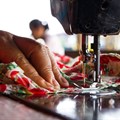While sustainability may be just a buzzword to some fashion companies, others ensure that every aspect of their business is sustainable - from the materials used to produce garments to ensuring that their staff is treated fairly.
“Ethical fashion brands are not just trendy, they contribute to a healthier environment for all of us,” said Heinrich Reynecke, managing director of Bertuzzi Distribution, a licenced distributor of fashion basics and imprint brands Fruit of the Loom, Gildan and Russell Europe.
“The fast fashion and high-volume clothing industry – consisting of inexpensive clothing and produced using low-grade, natural, raw as well as synthetic materials and chemicals and non-sustainable dyes – is an environmental and social issue worth noting. Clothing that avoids materials containing toxins, carcinogens or other harmful practices, and is made through sustainable practices which reduce waste production and water consumption, is better for the planet.”
Fair labour practices are essential to brands preaching about having high ethical standards.
“There are various independent bodies such as the Worldwide Responsible Accredited Production (Wrap) – which is dedicated to ensuring lawful, humane and ethical manufacturing throughout the world, looking at things such as workplace regulations, child labour, hours of work, health and safety, discrimination and security.” Good clothing brands should be able to produce certification, Reynecke added.
All three companies Bertuzzi distributes in South Africa subscribe to various audits like Oeko-Tex and Wrap to sustain and improve their environmental sustainability, social responsibility practices and business environment.
Gildan
Gildan, through its Genuine Responsibility initiative, has committed to more sustainable apparel by caring for its 50,000+ workers, taking steps to conserve environmental resources and building strong communities. The company also strives to reduce waste and minimise its impact on the environment, conducting regular environmental audits to ensure all facilities are within compliance.
With cotton being two-third of the company’s total fibre input, most of the land from where its cotton is purchased, is non-irrigated, using only natural rainfall. Gildan invests in developing local talent, hiring local and prioritising local suppliers while engaging with the community by investing in relevant projects.
Fruit of the Loom
Fruit of the Loom ensures that suppliers adhere to its conditions and rules of employment, and adopt measures to mitigate its ecological impact, abiding by all applicable international and local laws that are in place to protect the environment.
Fruit of the Loom reports its verified carbon footprint to the Carbon Disclosure Project, providing greater transparency and credibility to stakeholders. Ensuring its workplace is healthy and happy, and that the community in which they are operating are thriving, is promoted as a cornerstone of the business.
Its 4,300 locally-employed staff in Morocco enjoy benefits including healthcare, dental care, training and transport. Entirely self-sufficient, the plant has a water-treatment facility that recycles up to 60% of the water used, returning it to the river cleaner than when it arrived.
Russell Europe
Russell Europe has taken several steps to minimise its environmental footprint, including having its production facilities independently certified by Oeko-Tex and Wrap for adherence to international quality, ethical and sustainability standards.
“These brands are not simply paying lip service, they have certifiable credentials that ethical shoppers should be looking out for in this time of greenwashing,” Reynecke said.




































